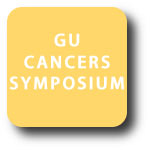ORLANDO, FL, USA (UroToday.com) - The goals of treatment for mCRPC are to increase overall survival (OS), delay symptoms, and maintain quality of life. Abiraterone acetate (AA) is a specific CYP17 inhibitor that blocks androgen biosynthesis and improves OS in mCRPC after docetaxel treatment (Lancet Oncol 2012; 13:983-92).
 In study COU-AA-302, AA plus prednisone (P) was compared to placebo plus prednisone in mildly symptomatic or asymptomatic patients with mCRPC who were chemo naïve. This is a pre-specified, updated, interim analysis (IA) -- after 55% of total OS events have occurred in COU-AA-302, which was in May, 2012. The total number of patients randomized was 1 088, with 546 randomized to receive AA 1 000 mg once daily, plus 5 mg prednisone twice daily, and 542 randomized to receive placebo once daily, plus 5 mg prednisone twice daily. The co-primary efficacy endpoints were radiographic progression-free survival (rPFS) and OS. The pre-specified secondary endpoints were: time to opiate use for cancer pain, time to initiation of chemotherapy, time to a decline in ECOG-performance status, and time to PSA progression (PCWG2 criteria). Median follow-up was 27.1 months.
In study COU-AA-302, AA plus prednisone (P) was compared to placebo plus prednisone in mildly symptomatic or asymptomatic patients with mCRPC who were chemo naïve. This is a pre-specified, updated, interim analysis (IA) -- after 55% of total OS events have occurred in COU-AA-302, which was in May, 2012. The total number of patients randomized was 1 088, with 546 randomized to receive AA 1 000 mg once daily, plus 5 mg prednisone twice daily, and 542 randomized to receive placebo once daily, plus 5 mg prednisone twice daily. The co-primary efficacy endpoints were radiographic progression-free survival (rPFS) and OS. The pre-specified secondary endpoints were: time to opiate use for cancer pain, time to initiation of chemotherapy, time to a decline in ECOG-performance status, and time to PSA progression (PCWG2 criteria). Median follow-up was 27.1 months.
At the time of this IA, both OS and rPFS, and secondary endpoints, all favored the AA group: OS for AA was 35.3 months vs. 30.1 months for P, rPFS was 16.5 vs. 8.3 months, time to opiate use was not reached for AA vs. 23.7 months for P, time to chemo start was 26.5 vs. 16.8 months, time to decline in ECOG was 12.3 vs. 10.9 months, and time to PSA progression was 11.1 vs. 5.6 months.
Improvement in rPFS (risk reduction 47%) remained statistically significant in this updated IA while risk of death decreased 21% but did not reach pre-specified efficacy boundary. All secondary endpoints were clinically and statistically significant. The safety profile has not changed and no new side effects were seen despite longer exposure.
Highlights of a presentation by Dana E. Rathkopf, MD at the 2013 Genitourinary Cancers Symposium - February 14 - 16, 2013 - Rosen Shingle Creek - Orlando, Florida USA
Memorial Sloan-Kettering Cancer Center, New York, NY USA
Written by Anna Forsberg, medical writer for UroToday.com
View Full 2013 GU Cancers Symposium Coverage


